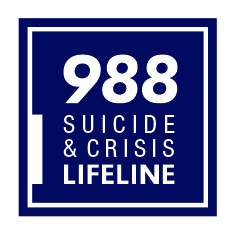Warning Signs and What to Do
When we know some key warning signs, we can all make a difference in helping to keep safe those individuals who might be thinking about suicide. Learn how to identify those at risk and how to ask about thoughts of suicide:
Suicide Warning Signs & Risk Factors:
- Talking about wanting to die or to kill oneself
- Acquiring or searching for ways to carry out a suicide plan
- Talking about feeling sad, depressed, and hopeless or having no reason to live
- Social withdrawal, loneliness, isolation
- Changes in mood or behavior; extreme mood swings
- Sleeping too little or too much
- Writings or social media posts that are bleak, depressing, or suicidal
- Anxiety, agitation, impulsivity, reckless behavior
- Giving away possessions or pets
- Talking about being a burden to others
- Overwhelming stress or loss-death, relationship, job, academic failure, or any other perceived loss
- Increased use of drugs/alcohol
- Showing rage or talking about seeking revenge
- Refusal to seek help from friends, family, or campus resources
What to Do
In an emergency situation, do not leave the person alone. Call 911 or get assistance from MSU Police (406-994-2121) or MSU staff (e.g. Residence Life).
Do:
- Be direct. Ask how they are doing and share your concerns and observations.
- Ask if they are thinking about suicide: Asking someone about suicide doesn’t put the idea into their head.
- Listen non-judgmentally: Allow them to express how they feel; don’t discuss whether suicide is right or wrong, or whether the feelings are good or bad.
- Get help: Call a crisis line, police, or agency that specializes in crisis intervention.
- Take action: Remove means, such as guns or pills.
- Show support: “I’m here to give you whatever support you need.”
- Offer hope: Let the person know that help and support are available, but don’t offer glib reassurance-it only shows you “don’t understand.”
Don't:
- Act shocked. This could put distance between you or create secrecy to protect your feelings
- Be sworn to secrecy. You both will need additional support
- Say that suicide is “selfish” or lecture about the value of life: It may reflect that you don’t hear their pain.
Who to Call
In an emergency:
- Suicide & Crisis Lifeline988
- Bozeman Help Center
406-586-3333 - University Police
406-994-2121 or 911 - Bozeman Deaconess Emergency Department
406-585-1000 - Hope House
406-585-1130 - MSU Counseling & Psychological Services (M-F, 8 a.m.–5 p.m.)
406-994-4531 - National Crisis Text Line
Text 741741
To consult when you are concerned about someone:
| Number | Resource |
|---|---|
| 406-994-4531 | MSU Counseling & Psychological Services (M-F 8 a.m.–5 p.m.) |
| 406-994-2311 | Student Health Services |
| 406-994-2826 | Dean of Students Office |
| 406-994-2661 | Residence Life |
| 406-994-2121 or 911 | University Police |
| 406-586-3333 | Bozeman Help Center |
For more in-depth training about identifying and referring those at risk for suicide, see Training and Prevention resources.

